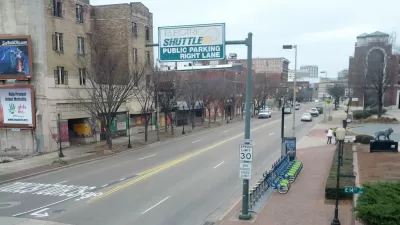Bike share programs are spreading throughout the United States, now in 36 urban areas, up from six four years ago. However, half the programs have encountered technical or financial difficulties, according to a tally by The Wall Street Journal.
Reporting from Chattanooga, where a small but successful two-year-old bike share program [we've posted articles on the Chattanooga Bicycle Transit System here and here] operates, Andrew Tangel of The Wall Street Journal illustrates some of the growing pains in bike share programs here and throughout the country.
The initial funding of $2.1 million (for Bike Chattanooga) has been spent, revenue has fallen short, and the number of yearly memberships sold to frequent riders is about 90% smaller than projected.
One problem cited: "an ample, cheap supply of parking." Parking for cars, that is.
Even the nation's largest program, Citi Bike in New York City, has experienced financial difficulties.
"The business is dominated by a small number of companies, including PBSC Urban Solutions Inc., of Montreal. PBSC sells bikes and technology to many of the biggest programs in the U.S. but filed for bankruptcy in January," writes Tangel.
PBSC's international operations have been purchased by Bruno Rodi. "We're looking forward to the logjam breaking," says Mia Birk, vice president of Alta Bicycle Share Inc., a Portland company that runs bike-share programs using PBSC's system.
Susan Shaheen, a researcher of bike-share programs at the University of California, Berkeley, adds: "The business model is still under development. Some of it is trial and error."
Ryan Rzepecki, chief executive of Social Bicycles Inc., of New York, supplier to eight cities was more straight forward. "The industry is kind of a mess."
Warts and all, programs are spreading. "By the end of next year, there could be as many as 38,000 shared bicycles across the U.S., researchers at Earth Policy Institute estimate," adds Tangel.
Correspondent's note: Link to Wall Street Journal article should be fully accessible to non-subscribers through July 17.
FULL STORY: Bike Shares Spread but Face Uphill Climb

Alabama: Trump Terminates Settlements for Black Communities Harmed By Raw Sewage
Trump deemed the landmark civil rights agreement “illegal DEI and environmental justice policy.”

Study: Maui’s Plan to Convert Vacation Rentals to Long-Term Housing Could Cause Nearly $1 Billion Economic Loss
The plan would reduce visitor accommodation by 25% resulting in 1,900 jobs lost.

Why Should We Subsidize Public Transportation?
Many public transit agencies face financial stress due to rising costs, declining fare revenue, and declining subsidies. Transit advocates must provide a strong business case for increasing public transit funding.

Paris Bike Boom Leads to Steep Drop in Air Pollution
The French city’s air quality has improved dramatically in the past 20 years, coinciding with a growth in cycling.

Why Housing Costs More to Build in California Than in Texas
Hard costs like labor and materials combined with ‘soft’ costs such as permitting make building in the San Francisco Bay Area almost three times as costly as in Texas cities.

San Diego County Sees a Rise in Urban Coyotes
San Diego County experiences a rise in urban coyotes, as sightings become prevalent throughout its urban neighbourhoods and surrounding areas.
Urban Design for Planners 1: Software Tools
This six-course series explores essential urban design concepts using open source software and equips planners with the tools they need to participate fully in the urban design process.
Planning for Universal Design
Learn the tools for implementing Universal Design in planning regulations.
Smith Gee Studio
Alamo Area Metropolitan Planning Organization
City of Santa Clarita
Institute for Housing and Urban Development Studies (IHS)
City of Grandview
Harvard GSD Executive Education
Toledo-Lucas County Plan Commissions
Salt Lake City
NYU Wagner Graduate School of Public Service



























